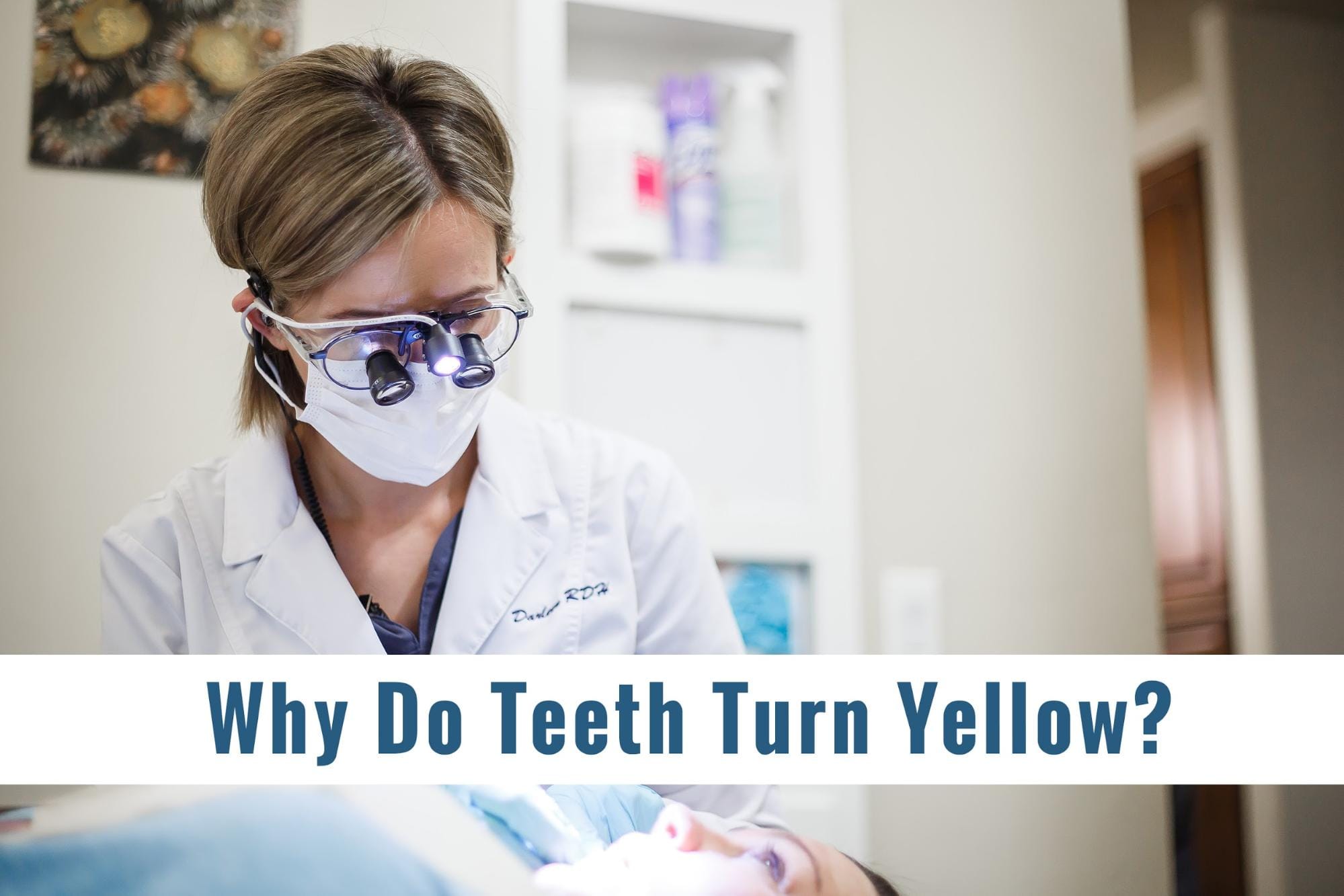
When you’re surrounded by a sea of advertisements and other media showing only perfectly even, white-toothed smiles, having teeth that are yellow can be embarrassing. There is implied judgment—i.e., teeth aren’t brushed enough—but there can be many reasons behind having yellow teeth.
As your local judgment-free dentist clinics, our dentists at Riverside Dental Care are here to tell you all about why teeth turn yellow, and how you can address yellowed teeth.
Teeth Can Yellow For Many Reasons
There are a number of reasons why your teeth may have become yellow. Sometimes, it can be due to consuming foods and drinks with staining properties. In other cases, yellow teeth can be caused by life-saving medications. Below are eight of the most common reasons why teeth turn yellow.
Genetics
Some people are genetically predisposed to having yellow teeth. It might be that genetically, you simply have thinner enamel, which allows the yellow-colored dentin below the enamel to show through. Your genetics also may dictate that your teeth can acquire stains more easily.
Smoking/Nicotine Use
Cigarette smoking is a fairly common source of yellow teeth. The tar and other additives stain the teeth, discoloring teeth unevenly. Also, yellowing teeth isn’t only for smokers. Using nicotine of any sort, like chewing tobacco, can also result in stained and discolored teeth.
Inconsistent Oral Hygiene
Daily toothbrushing in the morning and evening, as well as flossing at night, isn’t just something doctors recommend for fun—it really can protect your teeth from so many problems! Without consistent daily oral hygiene, it is more likely that your teeth will acquire stains and yellow.
Also, regular dental cleanings help prevent teeth from yellowing as it removes built-up plaque and calcium deposits, as well as light surface cleaning. That is often the source of the fresh feeling people enjoy after they are done with their dental cleaning appointment!
Food And Drink Stains
There are plenty of foods and drinks that can stain your teeth. A good rule of thumb is if it is a highly pigmented drink or food—i.e., coffee, berries, red wine, tomato sauce, tea, curry, etc.—then it probably can stain your teeth. Consistent oral hygiene can do a lot to combat these incidental stains, but your teeth may still yellow over time.
Too Much Fluoride
Generally, only an issue among young children, overexposure to fluoride can cause yellow or discolored teeth. Regular fluoride toothpaste shouldn’t be an issue, but an excess of fluorinated drinking water, fluoride supplements, and other consumables can lead children to have yellow teeth or white spots.
Medication
A number of medications can impact your teeth, ranging from antihistamines to chemotherapy. Often, these medications are necessary and shouldn’t be stopped just due to concerns over teeth discolorations. However, if you are starting a new medication, you may want to talk with your doctor about concerns regarding teeth discoloration and what options you may have to use a less impactful medication.
Aging
As we age, our enamel can naturally grow thinner. This process can be sped up by aggressive teeth brushing and by neglecting oral hygiene. With the thinner enamel, your teeth will appear more yellow due to the yellow dentin layer below.
Tooth Trauma
For some adults, if their tooth is injured, it can turn yellow. Usually, this kind of discoloration is permanent and can’t be whitened. When young children experience dental trauma, it will often turn their teeth black or grey, which indicates that the tooth is dead.
How To Whiten Yellow Teeth
Once your teeth are yellow, no amount of scrubbing with a toothbrush will reverse the process. Instead, brushing your teeth roughly can further damage your teeth and make them more yellow as the enamel is thinner, and the dentin is exposed. To correct yellow teeth, you will need cosmetic dentistry, such as:
- In-office teeth whitening – Professional teeth whitening is a service our dentists offer, and it can get your teeth whiter in one session than you would see using over-the-counter products.
- Dental crown – For teeth that are discolored beyond what whitening can fix, like a dead tooth, having a dental crown placed can repair your smile.
- Veneers – Sometimes, whitening your teeth is not the only cosmetic issue you have with your teeth. In these cases, veneers can be a great option, allowing you to have your smile reshaped and whitened at the same time.
If you are interested in seeing what teeth whitening treatments may work for your teeth, feel free to contact us today to set up your future consultation with one of our dentists. We are ready to help you enjoy a white, bright smile again!



Leave a Reply